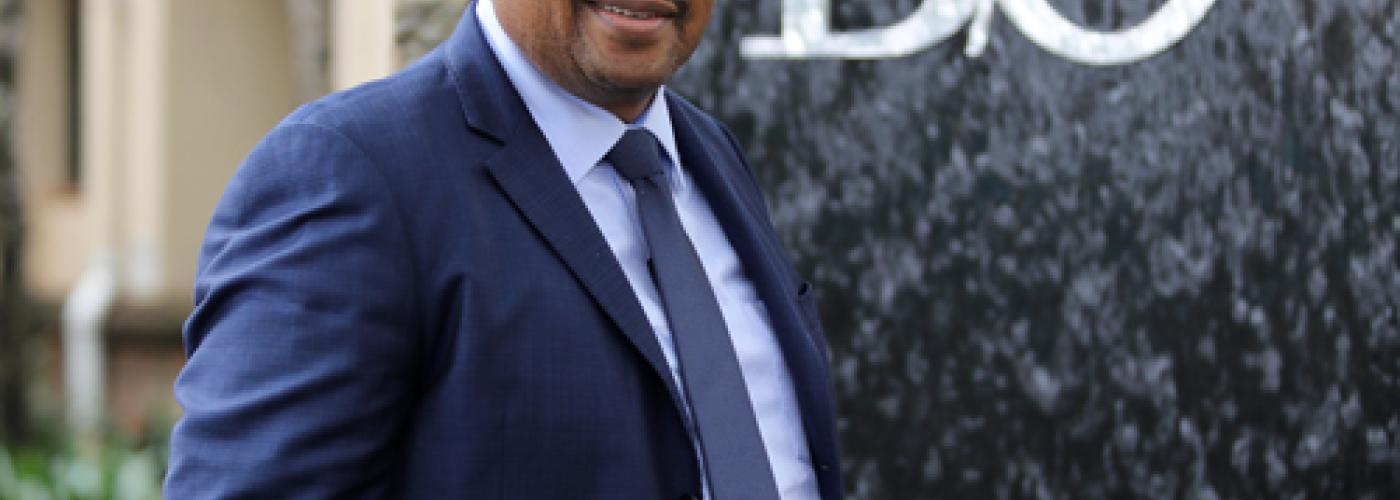
Get to know our Head of School: 12 Questions for Professor Maurice Radebe
1. Where were you born and where did you go to school?
I was born in Katlehong, Gauteng. I ended up in KZN for high school, first at a Catholic mission school, Inkamane, in Vryheid, and then at St Francis College in Mariannhill.
2. Who were your greatest influencers as a child?
My paternal grandparents were a big influence in my life, especially my grandfather who was an entrepreneur. He owned his own shops and at the age of 7, I was already helping behind the counter. I learnt so many valuable lessons, like the value of hard work, how to turn a profit, and customer service. I was maybe a bit resentful at the time, but I will always be grateful to my grandfather because he shielded me from negative influences in the township, such abuse of drugs and alcohol.
3. What did you study when you left school?
I did a BSc. in Applied Mathematics and Physics at the University of Limpopo, formerly the University of the North (affectionately known as “Turfloop”). I was also actively involved in the SRC (Students’ Representative Council) and the SCO (Students’ Christian Organisation) where I honed my leadership skills. It was also where I met my wife!
4. What were your first jobs?
My first job was a Process and Quality Controller in a factory that produced laminate products. I then left to take up a position doing community development work at at the NGO World Vision, getting involved in income generating projects in the rural areas. I ultimately became their National Training Facilitator, and at the same time completed my Higher Diploma in Education at Wits. It was during this period of my career that I realised I had a passion for education, training and developing people.
5. And your later career? What made you get into the energy industry?
I didn’t choose the energy industry, it chose me! It was through a university friend and fellow student leader that I got a job with Shell as their CSR Officer. Shell were fantastic at talent management, and they soon fast-tracked me into the retail space. I ended up as Regional Manager of Retail. I also did my MBA at WBS while I was working for Shell, and this experience reignited the entrepreneurial spark that had been there since childhood! After my MBA the perfect opportunity presented itself of being part of the team to start Exel – one of the first black-managed oil companies in South Africa. This small “upstart” dared to compete with the big guns - and I was up for the challenge. This was a historical mission and failure was not an option. It was so successful that Exel was ultimately bought out by Sasol Oil. I ended up spending 16 years at Sasol Limited, the final 10 years as a group executive member. During these years I held various portfolios including corporate affairs, sustainability, safety, health and the global energy business, as Sasol Executive Vice President.
6. What were you doing in 2020?
Phew! What a year. It was a very, very difficult year as a leader – the pandemic lead to a drop in demand for petroleum products which forced us to make tough decisions, such as shutting down certain refineries. The pandemic was a major disruption to our entire supply chain. My role as Executive Vice President of the Global Energy Business included safety, and managing Covid at our plants and depots was really difficult. I retired from Sasol in September 2020, when I turned 60. For three months I just needed to stop and breathe. But the energy soon came back!
7. What made you take on the leadership of Wits Business School?
When the opportunity arose, I reflected very deeply and realised this is very much in line with my purpose. This is not a ‘job’ for me, it’s an assignment which takes my vision to develop leaders onto a national and global stage; to develop the next generation of leaders who are ethical, who are authentic and who have a passion to make a difference. This opportunity has become my ‘true North’.
8. What is your vision for the school?
For me it’s about restoring the status of Wits Business School to its former glory, for posterity. WBS will be globally competitive but deeply rooted in Africa and ranked amongst the best business schools in the world. I believe WBS can be at the cutting edge of post-Covid economic recovery in this nation and can contribute significantly through the immense expertise within this school and at Wits main campus on the four main global trends – 1) digital transformation; 2) Energy transformation; 3) Climate change, and 4) Health care. As a business school we can respond to these trends by making sure that we develop leaders that will make a massive contribution not only on the continent but around the world. That is what excites me!
9. How would you describe your leadership style?
Collaborative and consultative.
10. What is your greatest strength?
Strategic leadership – the ability to see the vision, and to paint it in such a way that other people see it too. That’s what I’m doing right now – painting the vision so that it is imprinted upon everybody’s minds at WBS. I believe in long-term strategic leadership that delivers results.
11. And your greatest weakness?
Impatience. I have a very low tolerance for poor performance. I get impatient with people who are not pulling their weight. For me, it’s all hands on deck!
12. How do you like to spend your down time?
Ah – these days it’s my grandchildren! I spend a lot of time with them, teaching them to play golf. I also like watching soccer. And then Sunday morning it’s church.



